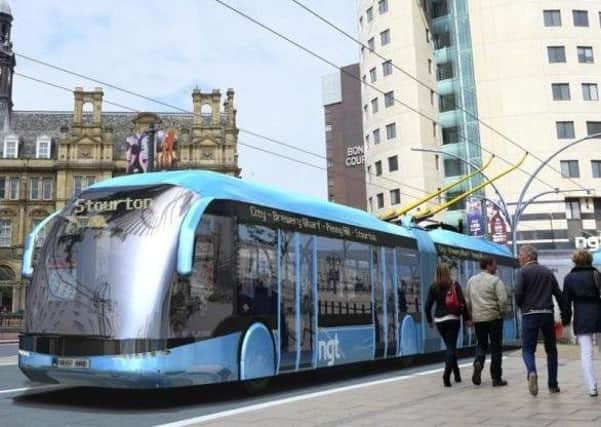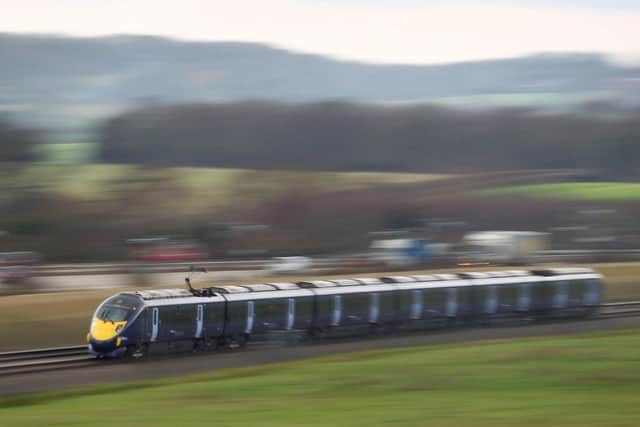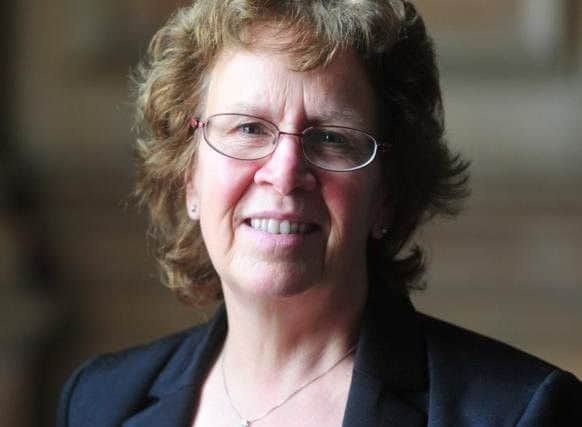'˜Trolleybus is so last week - Leeds is driving into the future' says council leader


And the city could be driving into that future in trailblazing fashion, it is hoped.
A week after the plans for a £250m trolleybus were scrapped by the Government, Leeds council leader Judith Blake is bidding to lay the ghost of NGT truly to rest.
Advertisement
Hide AdAdvertisement
Hide AdShe is calling a major transport summit in Leeds on June 10, where experts, academics and stakeholders will be invited to form a “coherent” voice from within the city to drive ideas and debate.


Speaking to the Yorkshire Evening Post ahead of the council’s AGM today (Thursday), councillor Blake admitted the city’s transport ambitions had been “blighted by waiting for the announcement on NGT” but added that “now we have the money in place, I think we can put that behind us, and move forward”.
The council has been promised by the Government that Leeds will keep the £173m earmarked for NGT.
The authority will now work with partners to come up with an alternative scheme, which the Government will still have to sign off on.
Advertisement
Hide AdAdvertisement
Hide AdAddressing recent criticism of the council over the trolleybas saga, Coun Blake pointed out that successive Governments and councils of different political persuasions - Leeds was led by a Tory-Lib Dem coalition until 2011- had played a part in the decades-long discussions.


And she insisted that the local leadership had always had its hands tied by central Government.
“Whenever we asked questions about what exactly our options were, we were led to believe - very clearly - that if we didn’t progress the NGT scheme we wouldn’t have the money ringfenced to us,”she said.
“That was absolutely the message that we were given. And there’s been a change in that conversation, dare I say it, since the [Boxing Day] flooding.”
Advertisement
Hide AdAdvertisement
Hide AdAsked if she would apologise on behalf of the council to the people of Leeds for backing a doomed project, she insisted any apology “would have to be collective”.


“This has been a cross party project. Everyone has had a part to play in it,” she said.
“I can’t answer for before we came back into power and that is part of the problem.
“It goes back a long time, and supertram was 10 years before.
Advertisement
Hide AdAdvertisement
Hide Ad“If there is an apology to make, then none of us would shy away from that.


“But I think now the real focus is to learn from what has happened, to understand that - looking back - there have probably been decisions made in the past that haven’t been made with full consultation with everybody involved.
“There ares serious lessons to be learnt from this, for all of us.
“We have to reflect on why we are in the position we are now.
Advertisement
Hide AdAdvertisement
Hide Ad“But we mustn’t let that detract from our real ambition to come together, to move forward, and to make sure that we have the transport system that the city needs and deserves.”
The council leader said “dealing with issues with connectivity” was key to the future direction of the city’s policy on public transport.
She cited “horrendous” congestion in Leeds and other big cities, air pollution and other factors which are vital to future talks and planning.
“Whilst we already have state of the start rapid transport systems going into some of our big cities, there are broader issues that we need to address,” she said.
Advertisement
Hide AdAdvertisement
Hide Ad“I am not going to pre-empt conversations on June 10, but I think they will be around park and ride, around the potential to open up other railways stations, around tram-train - the one that seems to be generating quite a lot of interest - but also there are all sorts of innovations happening.
“There are major trials going on in driverless cars. We don’t know where that might take us, looking ahead 20 or 30 years.
“The other major factor for the city is the HS2, the reconfiguration of the station [into] the biggest transport hub in the North.
“We need to lever in all of that to get more resource coming into Leeds.
Advertisement
Hide AdAdvertisement
Hide Ad“The fundamental thing that we are learning from this is that decisions around key infrastructure such as these projects should be made locally, determined locally and resource should be brought down locally to enable us to make the key decisions, act upon them and move forward on them.”
She acknowledged that listening to local people would “always” have to be a key factor.
And asked how much control the city would ultimately have in what happens next, Coun Blake said: “We have said very clearly that we want it to be straightforward, clear and deliverable. We don’ want to get caught up in red tape.
“It’s for the benefit of the whole country that cities like Leeds are firing on all cylinders and having a modern, fit for purpose transport system is one of the major factors we need to address.”